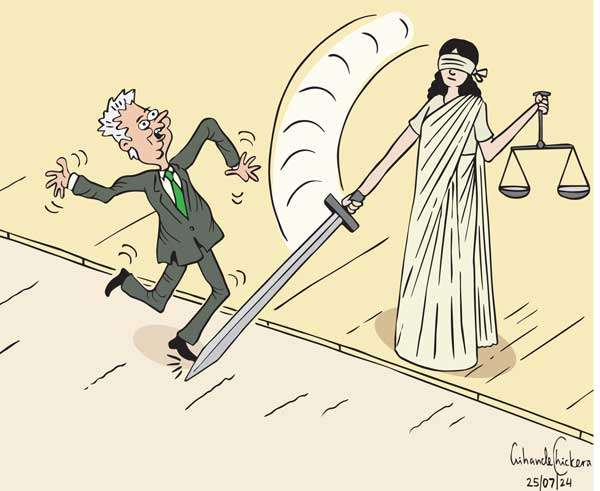1. The claim by the Government that the Constitutional Council is not subject to the jurisdiction of the Supreme Court is not true. Article 41J of the Constitution has made the Constitutional Council subject to the provisions of Article 126 of the Constitution which is the Fundamental Rights jurisdiction of the Supreme Court. A seven judge bench of the Supreme Court decided in 2002 that the CC is not immune.
2. The claim that the Constitutional Council is an extension of the legislature is not true. Merely because there are seven parliamentarians on it does not make it an extension of Parliament. It performs an executive function. In fact in the Constitution the chapter VIIA on the CC is among the chapters on the Executive. Again the Supreme Court has clearly decided on this matter earlier.
3. As regards the IGP the Constitutional Council does not make its recommendation to the President. It is the President who nominates a person for approval of the CC and the President makes the appointment. In relation to the IGP the entire argument revolved around the issue that there was no proper approval obtained from the Constitutional Council prior to the appointment. The President’s powers of appointment and all other powers except the power to declare war and peace are subject to the Fundamental Rights jurisdiction after the 19th Amendment to the Constitution passed in 2015 by Parliament itself.
4. Speaker Anura Bandaranaike’s ruling has no bearing in respect of the IGP. That related to an order by the Supreme Court restraining the Speaker from appointing a Committee to inquire into the Chief Justice Sarath Silva. That was in respect of proceedings in Parliament. The appointment of the IGP has nothing to do with Parliamentary proceedings.
5. Parliamentary Privileges is only to the extent provided by law. The law does not give the Constitutional Council immunity or make it subject to Parliamentary privilege.
6. What we are witnessing is an outrageous attempt by the Executive to disobey a court ruling and an attempt to keep someone prevented by court to cling on to office.
7. Neither the Prime Minister nor the Speaker are legally entitled to overrule the interim orders given in respect of the IGP.
8. If the IGP defies the SC order he will open himself for a contempt charge in due time. Any police officer who acts on on orders of Mr. Tennekoon will be acting on illegal orders and they too will have to face consequences of their actions.
Saliya Peris further stays that:
RW should resign
There is a news alert saying that Ranil Wickremesinghe has informed the Speaker that he will refrain from participating in appointing an acting IGP since he has been advised by his “legal team” that he would be subject to election petitions. This is another shameless attempt to circumvent the court order which he does not have the grace and dignity to accept. Does that mean that if a key official resigns or dies that RW will not make any appointments until the election? Does that mean RW will stop going round the country distributing lands and benefits to people which impact on the election? This is a clear dereliction of duty on the part of the President. The President has certain constitutional functions that no one else can perform. If he cannot perform these duties then he must temporarily step down and allow the Prime Minister to perform his duties as allowed in the Constitution.
Not first but Judicuary prevailed
Attempts by politicians at the highest levels to circumvent court orders are nothing new. One such was in 1980/81 when the Court of Appeal unseated the Member of Parliament for Kalawana Abeyratne Pilapitiya. After this the Member obtained a ruling of the Speaker that he was entitled to remain in Parliament even though he had been ousted by a court ruling. However, the Elections Commissioner based himself on the court order and proceeded with the by-election for the Kalawana Seat. President J.R.Jayewardena obviously not having expected that reaction from the Elections Commissioner then introduced a Constitutional Amendment allowing for two members to represent Kalawana- one the unseated MP and the second for the MP to be elected at the by-election. The Supreme Court considered that amendment as an urgent bill. One party – the Civil Rights Movement represented by S. Nadesan QC one of the bravest leaders of the Bar with Mrs. Surya Wickremesinghe was heard in opposition. A five-judge bench of the Supreme Court ruled that this amendment required a referendum. When that happened J.R.Jayewardene backed down. Abeyratne Pilapitiya resigned from Parliament. The winner of the by-election Sarath Muttettuwegama of the Communist Party took his rightful seat in the benches of the Opposition. Full details of this episode are found in an article which was published in the FT which I have shared in the comments below.
From Saliya Peris Face Book.
